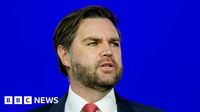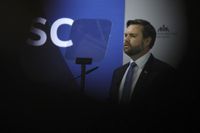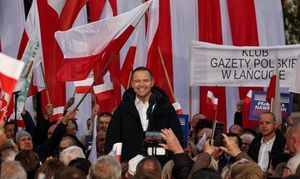In a high-stakes political environment shaped by decades-old alliances, Vice President JD Vance's views on Europe have surfaced with alarming clarity. Recent leaks from a private group chat involving senior Trump administration officials have revealed the vice president's deep skepticism toward NATO and European allies. Vance's comments sparked outrage among European and British officials, exposing the rift in U.S.-European relations.
The leaked messages, inadvertently shared by a high-ranking member of the Trump administration, showcased a striking conversation regarding potential U.S. military operations against Houthi rebels in Yemen. Vance candidly expressed his disdain for U.S. involvement in European affairs, stating, "I just hate bailing Europe out again." This sentiment was echoed by Defense Secretary Pete Hegseth, who responded, "I fully share your loathing of European freeloading. It's PATHETIC," as reported by The Atlantic.
This exchange is not merely a slip of the tongue but a reflection of Vance's long-standing position on American foreign policy. As a senator, he famously downplayed the importance of U.S. support for Ukraine, suggesting at one point that he did not "really care what happens to Ukraine one way or another." His subsequent selection as vice president raised hopes that his views might evolve, but the recent leak suggests no change has occurred.
The fallout from these revelations was immediate, and reaction from European leaders was swift. Many expressed shock and hurt at the comments, particularly in light of the U.S. commitment to NATO and transatlantic alliances. European officials stunned by the leak spoke of feeling insulted by the insinuation that they do not pay their fair share for their own defense.
The diplomatic malaise deepened during a combative Oval Office meeting in late February 2025, where Vance confronted Ukrainian President Volodymyr Zelensky. Intended as a serious discussion regarding U.S. support for Ukraine, the meeting quickly devolved into a public spectacle. Vance chastised Zelensky, saying, "You should be thanking the president for trying to bring an end to this conflict," which prompted a pointed rebuttal from the Ukrainian leader, who replied, "I'm not playing cards. I'm very serious, Mr. President. I'm the president in a war." The encounter ended without an agreement, further escalating tensions between the U.S. and Ukraine.
Vance's critiques did not stop in the Oval Office. Earlier, at the Munich Security Conference, he delivered a blistering keynote address where he largely dismissed the threat posed by Russia, instead focusing on what he termed the internal dangers facing European democracies. His comments about European leaders running in fear of their voters and referring to the prosecution of dissenting voices drew widespread condemnation from attendees, described by press outlets as a "violent attack on European democracy."
One stark example of this was his defense of Germany's far-right Alternative für Deutschland (AfD) party following its exclusion from the Munich proceedings. Vance called for a breaking of the "firewall" that has traditionally shielded mainstream parties from engaging with populist voices, a statement that many perceived as an endorsement of divisive politics.
His remarks at the Munich conference sparked headlines across Europe, with reactions ranging from disbelief to anger among European politicians who felt that a U.S. vice president should have a more nuanced understanding of what it means to support transatlantic security. Vance's hostile tone and clear disdain for European authorities were starkly underscored when he later appeared on Fox News to dismiss the prospect of a European-led peacekeeping force in Ukraine, casting doubt on the viability of efforts for a stable resolution to the ongoing conflict.
The fallout from these comments has forced European diplomats to reevaluate their expectations of U.S. support. Former French Foreign Minister Hubert Védrine articulated the feeling among many European officials that Vance's approach signals an existential threat to the post-war order. He stated, "The Trump administration does not see allies, only dependents he considers parasites." This mindset, they fear, has the potential to disrupt NATO's unity and strength.
Ultimately, Vance's rhetoric is seen as a strategy to push Europe toward greater strategic independence. Védrine noted, "His hostility to alliances is deliberate. It's rooted in the idea that foreign policy should serve a narrow domestic narrative." Observers note that this shift may force European nations to consider investing more in their defense capabilities, potentially altering the landscape of international relations.
As Vice President Vance's controversial comments continue to reverberate across the Atlantic, implications for future U.S.-European interactions remain uncertain. The flames of suspicion and resentment may lead to a fracturing of longstanding alliances, raising questions about whether the geopolitical landscape can withstand such divisive rhetoric and policy shifts.






